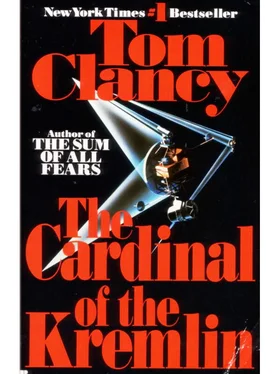Tom Clancy - The Cardinal of the Kremlin
Здесь есть возможность читать онлайн «Tom Clancy - The Cardinal of the Kremlin» весь текст электронной книги совершенно бесплатно (целиком полную версию без сокращений). В некоторых случаях можно слушать аудио, скачать через торрент в формате fb2 и присутствует краткое содержание. Год выпуска: 1988, Жанр: Триллер, на английском языке. Описание произведения, (предисловие) а так же отзывы посетителей доступны на портале библиотеки ЛибКат.
- Название:The Cardinal of the Kremlin
- Автор:
- Жанр:
- Год:1988
- ISBN:нет данных
- Рейтинг книги:3 / 5. Голосов: 1
-
Избранное:Добавить в избранное
- Отзывы:
-
Ваша оценка:
- 60
- 1
- 2
- 3
- 4
- 5
The Cardinal of the Kremlin: краткое содержание, описание и аннотация
Предлагаем к чтению аннотацию, описание, краткое содержание или предисловие (зависит от того, что написал сам автор книги «The Cardinal of the Kremlin»). Если вы не нашли необходимую информацию о книге — напишите в комментариях, мы постараемся отыскать её.
The Cardinal of the Kremlin — читать онлайн бесплатно полную книгу (весь текст) целиком
Ниже представлен текст книги, разбитый по страницам. Система сохранения места последней прочитанной страницы, позволяет с удобством читать онлайн бесплатно книгу «The Cardinal of the Kremlin», без необходимости каждый раз заново искать на чём Вы остановились. Поставьте закладку, и сможете в любой момент перейти на страницу, на которой закончили чтение.
Интервал:
Закладка:
"But they haven't said anything about it," Narmonov observed.
"The Americans have occasionally been reticent to discuss such things. They complain about some technical aspects of our defense activity, but not all of them, for fear of compromising their intelligence-gathering methods," Gerasimov explained casually. "Possibly they have conducted similar tests, though we have not learned of it. The Americans, too, are able to maintain secrecy when they wish." Taussig had never gotten that information out either. Gerasimov leaned back to let others speak.
"In other words, both sides will continue as before," Narmonov concluded.
"Unless we are able to win a concession," the Foreign Minister said. "Which is unlikely to happen. Is there anyone at this table who thinks we should restrict our missile-defense programs?" There wasn't. "Then why should we realistically expect the Americans to feel any differently?"
"But what if they get ahead of us!" Alexandrov demanded.
"An excellent point, Mikhail Petrovich," Narmonov seized the opportunity. "Why do the Americans always seem to get ahead of us?" he asked the assembled chieftains of his country.
"They do so not because they are magicians, but because we allow them to – because we cannot make our economy perform as it should. That denies Marshal Yazov the tools our men in uniform need, denies our people the good things of life that they are coming to expect, and denies us the ability to face the West as equals."
"Our weapons make us equals!" Alexandrov objected.
"But what advantage do they give us when the West has weapons, too? Is there anyone around this table who is content to be equal to the West? Our rockets do that for us," Narmonov said, "but there is more to national greatness than the ability to kill. If we are to defeat the West, it cannot be with nuclear bombs – unless you want the Chinese to inherit our world." Narmonov paused. "Comrades, if we are to prevail we have to get our economy moving!"
"It is moving," Alexandrov said.
"Where? Do any of us know that?" Vaneyev asked, igniting the room's atmosphere.
The discussion turned boisterous for several minutes before settling down to the collegial sort of discussion normal to the Politburo. Narmonov used it to measure the strength of his opposition. He deemed his faction more than equal to that of Alexandrov's. Vaneyev hadn't tipped his hand – Alexandrov expected him to pretend to be on the Secretary's side, didn't he? And the General Secretary still had Yazov. Narmonov had also used the session to defuse the political dimension of his country's economic problems by couching the need for reforms as a means of improving the country's military power – which was true, of course, but was also an issue difficult for Alexandrov and his clique to deny. By taking the initiative, Narmonov judged, he'd been able to evaluate the other side's strength yet again, and by putting the argument in the open, he'd put them on the psychological defensive at least temporarily. It was all he could hope for at the moment. He'd lived to fight another day, Narmonov told himself. Once the arms-control treaty went through, his power at this table would increase another notch. The people would like that – and for the first time in Soviet history, the feelings of the people were beginning to matter. Once it had been decided which arms would be eliminated, and over what sort of schedule, they'd know how much additional money there would be to spend. Narmonov could control that discussion from his seat, using the funds to barter for additional power in the Politburo as members vied for it in pursuit of their own pet projects. Alexandrov could not interfere with that, since his power base was ideological rather than economic. It occurred to Narmonov that he would probably win out. With Defense at his back, and with Vaneyev in his pocket, he would win the confrontation, break KGB to his will, and put Alexandrov out to pasture. It was only a matter of deciding when to force the issue. There had to be agreement on the treaty, and he would gladly trade away small advantages on that score in order to secure his position at home. The West would be surprised by that, but someday it would be more surprised to see what a viable economy would do for its principal rival. Narmonov's immediate concern was his political survival. After that came the task of bringing life back into his country's economy. There was a further objective, one that hadn't changed in three generations, though the West was always discovering new ways to ignore it. Narmonov's eyes weren't fixed on it, but it was still there.
Last session , Ryan told himself. Thank God. The nervousness was back. There was no reason that everything shouldn't go well – the odd part was that Ryan had no idea what would happen with Gerasimov's family. "Need-to-know" had again raised its wearisome head on that score, but the part about getting Gerasimov and CARDINAL out was so breathtakingly simple that he would never have come up with it. That part was Ritter's doing, and the crusty old bastard did have a flair.
The Russians spoke first this time, and five minutes into the speech, they proposed a warning time for surprise on-site inspections. Jack would have preferred zero-time, but that was unreasonable. It wasn't necessary to see what the insides of the birds looked like, desirable as that would be. It was enough to count the launchers and the warheads, and anything under ten hours was probably enough for that – especially if the snap visits were coordinated with satellite passes to catch any attempt at sleight-of-hand. The Russians offered ten hours. Ernest Allen, in his reply, demanded three. Two hours later the respective figures were seven and five. Two hours after that, much to everyone's surprise, the Americans said six, and the chief Russian delegate nodded consent. Both men rose and leaned across the table to shake hands. Jack was glad it was all over, but would have held out for five. After all, he and Golovko had agreed on four, hadn't they?
Four and a half hours to settle on one damned number , Jack thought. And that may be an all-time record. There was even some applause when everyone stood, and Jack joined the line for the nearest men's room. A few minutes later he returned. Golovko was there.
"Your people let us off easy," the KGB officer said.
"I guess you're lucky it wasn't my job," Jack agreed. "This is a hell of a lot of work for two or three little things."
"You think them little?"
"In the Great Scheme of Things… well, they're significant, but not overly so. Mainly what this means is that we can fly home," Jack observed, and some unease crept into his voice. It isn't over yet.
"You look forward to this?" Golovko asked.
"Not exactly, but there you are," It isn't the flight that makes me nervous this time, sport.
The flight crew had stayed at the Hotel Ukrania, just on the Moscow River, doubling up in the huge rooms, shopping in the "friendship store" for souvenirs, and generally seeing what they could while maintaining a guard team on the aircraft. Now they checked out together and boarded a fifty-passenger tourist bus that crossed over the river and headed east on Kalinina Prospekt on its way to the airport, a half-hour drive in the light traffic.
When Colonel von Eich arrived, the British Airways ground crew that provided maintenance support was finishing up the fueling under the watchful eyes of his crew chief – the chief master sergeant who "owned" the aircraft – and the Captain who'd serve as copilot in the VC-137's right seat. The members of the crew checked through the KGB control point, whose officers were assiduously thorough in verifying everyone's identity. Finished, the crew filed aboard, stowed its gear, and began getting the converted 707 ready for its flight back to Andrews Air Force Base. The pilot gathered five of his people together in the cockpit, and under the covering noise of somebody's boomer-box, informed them of what they'd be doing tonight that was "a little different."
Читать дальшеИнтервал:
Закладка:
Похожие книги на «The Cardinal of the Kremlin»
Представляем Вашему вниманию похожие книги на «The Cardinal of the Kremlin» списком для выбора. Мы отобрали схожую по названию и смыслу литературу в надежде предоставить читателям больше вариантов отыскать новые, интересные, ещё непрочитанные произведения.
Обсуждение, отзывы о книге «The Cardinal of the Kremlin» и просто собственные мнения читателей. Оставьте ваши комментарии, напишите, что Вы думаете о произведении, его смысле или главных героях. Укажите что конкретно понравилось, а что нет, и почему Вы так считаете.






![Александр Ирвин - Tom Clancy’s The Division 2. Фальшивый рассвет [litres]](/books/417744/aleksandr-irvin-tom-clancy-s-the-division-2-falsh-thumb.webp)





